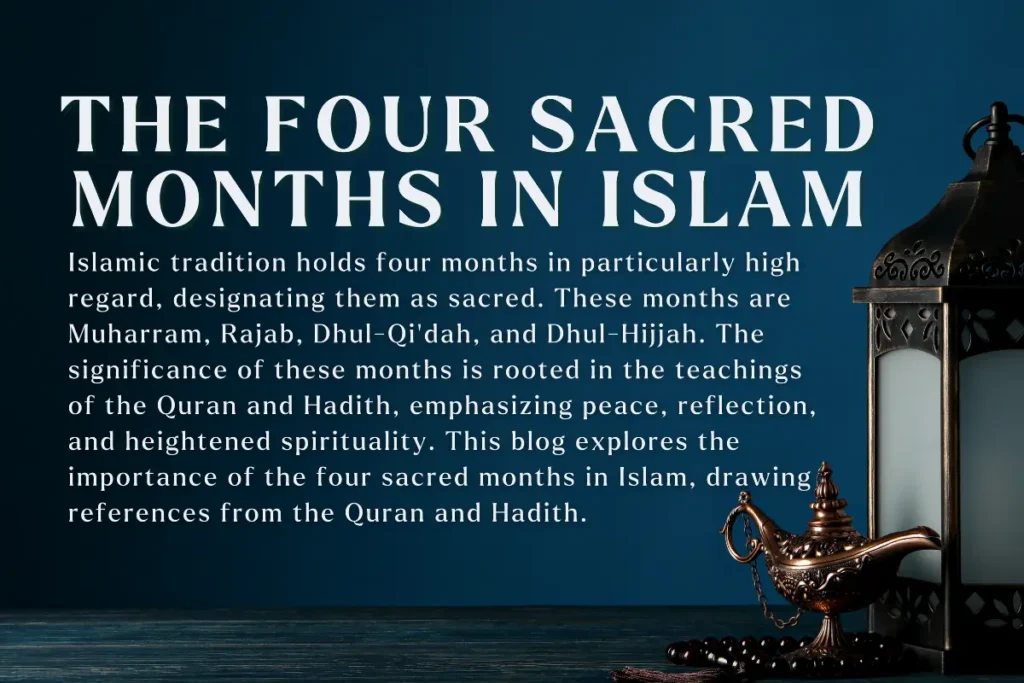Islamic tradition holds four months in particularly high regard, designating them as sacred. These months are Muharram, Rajab, Dhul-Qi’dah, and Dhul-Hijjah. The significance of these months is rooted in the teachings of the Quran and Hadith, emphasizing peace, reflection, and heightened spirituality. This blog explores the importance of the 4 sacred months in Islam, drawing references from the Quran and Hadith translations.
The Sacred Months: A Quranic Perspective
The concept of the four sacred months is explicitly mentioned in the Quran. Allah says:
“Indeed, the number of months with Allah is twelve months in the register of Allah from the day He created the heavens and the earth; of these, four are sacred. That is the correct religion, so do not wrong yourselves during them…“
(Quran 9:36)
This verse highlights the sanctity of these months of Islam, urging Muslims to avoid injustice and maintain a heightened sense of piety during these periods.

1. Muharram: The First Sacred Month
Muharram, the first month of the Islamic lunar calendar, is often referred to as the “Month of Allah.” The significance of Muharram is highlighted by the fasting observed on the Day of Ashura, the 10th day of the month. The Prophet Muhammad (peace be upon him) emphasized the importance of this day:
“The best of fasts after the month of Ramadan is in the month of Allah, Muharram.“
(Sahih Muslim)
The Day of Ashura commemorates significant historical events, including the deliverance of Prophet Musa (Moses) and the Israelites from Pharaoh’s tyranny. Fasting on the day of Ashura is believed to expiate the previous year’s sins.
2. Rajab: The Month of Spiritual Preparation
Rajab, the seventh month of the Islamic calendar, is another sacred month. It is a time for Muslims to prepare spiritually for the upcoming month of Ramadan. The Prophet Muhammad (peace be upon him) used to pray for blessings in this month, saying:
“O Allah, bless us in Rajab and Sha’ban and let us reach Ramadan.“
(Musnad Ahmad)
Rajab is an opportunity for increased devotion, including additional prayers, fasting, and seeking forgiveness.
3. Dhul-Qi’dah: The Month of Truce
Dhul-Qi’dah, the eleventh month of the Islamic calendar, is traditionally a time of peace and truce. Historically, this month was designated as a period during which warfare was prohibited, allowing for a safe pilgrimage to Mecca. The sanctity of Dhul-Qi’dah emphasizes the importance of maintaining peace and avoiding conflicts.
4. Dhul-Hijjah: The Month of Hajj
Dhul-Hijjah, the twelfth and final month of the Islamic calendar, holds immense significance due to the annual pilgrimage of Hajj. The first ten days of Dhul-Hijjah are particularly blessed, with the Prophet Muhammad (peace be upon him) stating:
“There are no days on which righteous deeds are more beloved to Allah than these ten days.“
(Sahih Bukhari)
The Day of Arafah, on the 9th of Dhul-Hijjah, is a pivotal day during Hajj, where pilgrims gather on the plain of Arafat to seek Allah’s forgiveness. Fasting on this day for those not performing Hajj is highly recommended, as it expiates the sins of the previous and upcoming year.
The Importance of the Four Sacred Months
The four sacred months serve as a reminder for Muslims to increase their acts of worship, seek forgiveness, and avoid sinful behavior. The heightened spirituality during these months helps Muslims to strengthen their relationship with Allah and prepare for significant events like Ramadan and Hajj.
The Prophet Muhammad (peace be upon him) said:
“The year is twelve months, of which four are sacred: three consecutive months, Dhul-Qi’dah, Dhul-Hijjah and Muharram, and Rajab…“
(Sahih Bukhari)
This Hadith underlines the special status of these months and their importance in the Islamic calendar.
Final Thoughts
The four sacred months in Islam—Muharram, Rajab, Dhul-Qi’dah, and Dhul-Hijjah—are periods of heightened spirituality and reflection. By observing increased devotion, avoiding conflicts, and engaging in righteous deeds, Muslims honor the sanctity of these months as emphasized in the Quran and Hadith.
As we navigate through these sacred periods, we are reminded of the timeless principles of peace, justice, and devotion that form the core of Islamic teachings.











4 Responses
ALHUMDOLILLAH. Very informative.
Assalam Wa Alaikum
Alhamdulillah I intended the Jumuah Khutba and the 4 sacred months was the topic we were told that it’s important to know these and remember how we’re supposed to live during those months In Sha Allah.
May Allah Bless you for your work and grant you everything in this life and the hereafter.
Very helpful
Assalam alaykum warahmatullahi wabarakaatuh baarakallahu fiyk.. very informative short and precise
What are the 4 months of Hajj as mentioned in the quran 2 .197